必修一unit4_earthquake_学案分解
高中英语人教版必修1教案-Unit_4_Earthquakes_教学设计_教案
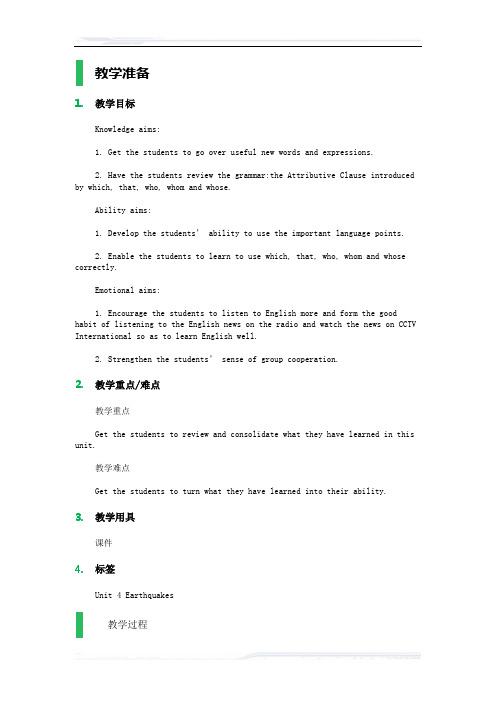
教学准备1. 教学目标Knowledge aims:1. Get the students to go over useful new words and expressions.2. Have the students review the grammar:the Attributive Clause introduced by which, that, who, whom and whose.Ability aims:1. Develop the students’ ability to use the important language points.2. Enable the students to learn to use which, that, who, whom and whose correctly.Emotional aims:1. Encourage the students to listen to English more and form the good habit of listening to the English news on the radio and watch the news on CCTV International so as to learn English well.2. Strengthen the students’ sense of group cooperation.2. 教学重点/难点教学重点Get the students to review and consolidate what they have learned in this unit.教学难点Get the students to turn what they have learned into their ability.3. 教学用具课件4. 标签Unit 4 Earthquakes教学过程Step 1 Revision1. Check the homeworkexercises.2. Dictate some usefulnew words and expressions in this unit.→Step 2 Lead-inTell the students:Up tonow, we have finished Unit 4. Have you learned and grasped all in this unit?Turn to Page 32. You can check yourself by filling in the blanks in the partSumming Up.→Step 3 Summing UpFive minutes for thestudents to sum up by themselves. Then check and explain something wherenecessary.Suggested answers:Write down what you havelearned about earthquakes.We have learned basicknowledge about earthquakes, how to protect oneself and help others in anearthquake.From this unit you havealso learneduseful verbs:shake,rise, crack, burst, ruin, injure, destroy, shock, rescue, organize, bury,judge, honor, prepareuseful nouns:shake,well, rise, crack, pond, pipe, burst, canal, steam, dirt, ruin, survivor,brick, dam, steel, shock, quake, electricity, disaster, army, coal, mine,shelter, percent, speech, judge, honor, Europeother expressions:rightaway, at an end, dig out, a(great)number of, give out, thousands ofnew grammar item:theAttributive Clause introduced by which, that, who, whom and whose→Step 4 Word andexpression exercisesShow the exercises onthe screen or give out exercise papers.1. Complete thefollowing sentences with the proper forms of the words and expressions givenbelow.shake honor percent burst prepare rescue injure destroy shock judge ruininstead of a(great)number of at an end dig out1)He was______________for his courage in battle.2)Will you helpme______________ for the get-together of the old classmates?3)The fire______________all my books.4)Thehouse______________ as the heavy truck went past.5)“Sixty______________of the pupils are boys” means that of every hundred pupils, sixty are boys.6)They______________ outlaughing.7)There were twopeople______________ in the car accident.8)We can’t______________what he really meant by doing so till we know all the circumstances.9)If you are busy at thevery time, let me do it______________ you.10)The Second World Warwas______________ in 1945.11)After the earthquake,all the tall buildings were______________.12)She was______________at the news of her mother’s death.13)They______________ aboy from drowning.14)They______________the treasures hidden under the earth.15)Thereare______________ people there.2. Choose the bestanswers:1)Seeing the buildingwas falling down, the people in it ranout______________.A. right nowB. right thenC. right awayD. right out2)The rescue teamnoticed a lot of people______________ under fallen houses.A. trappedB. trappingC. to trapD. to be trapped3)He likes to makefriends so much that______________ he goes he becomes a friend of many people.A. at the placeB. whereC. somewhereD. everywhere4)The factoryproduces______________ steel every day,burning______________ coal.A. many; manyB. hundreds of tons of;very muchC. much; hundreds oftonsD. hundreds of tons of;a large number of5)The days when peoplecouldn’t say what they want to sayare______________ forever.A. lostB. missingC. goingD. gone6)While playing footballYang Yong had his leg broken and was taken to hospital__________.A. by our carB. by carC. in carD. on bike7)Today we feelproud______________ our school.A. ofB. withC. forD. in8)The new roadis______________ and______________ my hometown.A. 35 meters wide; 500meters awayB. wide 35 meters; away500 metersC. 35 meters wide; 500meters away fromD. wide 35 meters; 500meters away from9)He spent themoney______________ by his parents buying a large house.A. leavingB. leftC.remainingD. remained10)The man______________the box down and______________ down for a rest.A. lay; layB.lied; laidC. lay; laidid; layFirst get the studentsto do the exercises. Then the answers are given. The teacher can give themexplanations where necessary.Suggested answers:1. 1)honored 2)prepare 3)destroyed 4)shook 5)percent 6)burst7)injured8)judge 9)instead of 10)at an end 11)destroyed/inruins/ruined 12)shocked13)rescued 14)dug out 15)a(great)number of2. 1)C 2)A 3)D 4)B 5)D 6)B 7)A 8)C 9)B 10)D→Step 5 GrammarexercisesShow the exercises onthe screen or give out exercise papers.1. Fill in the blanks,using which, that, who, whom and whose.1)Theforce______________ causes everything to fall towards the ground is calledgravity.2)A friend______________helps you in time of need is a friend indeed.3)Do you know thegirl______________ parents are teachers in our school?4)Thewoman______________ I spoke to just now is my English teacher.5)He saw ahouse______________ windows were all broken.6)Everything______________can be done today mustn’t be done tomorrow.7)Can you think ofanyone______________ could look after him?8)This is the besthotel______________ I know.9)The man______________I saw told me to come back today.10)Those______________want to go to the Great Wall write down your names here.11)He talked a lot aboutthe teachers and the schools______________ he had visited.12)The ninthlesson______________ we are learning is the mostdifficult in Book One.13)MountBlanc,______________ they visited last month, is the highest mountain inEurope.14)We know all theteachers______________ work in our school.15)The housein______________ Lu Xun once lived is a museum now.16)Thehouse______________ Lu Xun once lived in is a museum now.17)You can take anyroom______________ you like.18)He showed amachine______________ parts are too small to be seen.2. Translate thefollowing sentences, using attributive clauses.1)抢劫她的人已经被逮捕了。
人教新课标必修一 Unit 4 Earthquakes学案
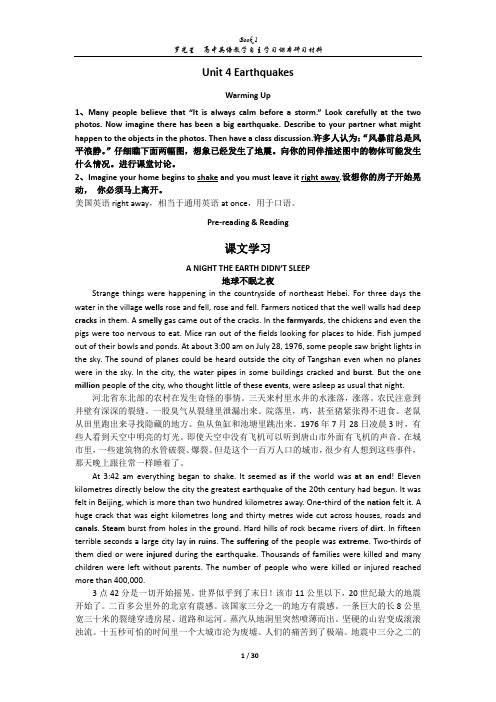
Unit 4 EarthquakesWarming Up1、Many people believe that “It is always calm before a storm.” Look carefully at the two photos. Now imagine there has been a big earthquake. Describe to your partner what might happen to the objects in the photos. Then have a class discussion.许多人认为:“风暴前总是风平浪静。
”仔细瞧下面两幅图,想象已经发生了地震。
向你的同伴描述图中的物体可能发生什么情况。
进行课堂讨论。
2、Imagine your home begins to shake and you must leave it right away.设想你的房子开始晃动,你必须马上离开。
美国英语right away,相当于通用英语at once,用于口语。
Pre-reading & Reading课文学习A NIGHT THE EARTH DIDN’T SLEEP地球不眠之夜Strange things were happening in the countryside of northeast Hebei. For three days the water in the village wells rose and fell, rose and fell. Farmers noticed that the well walls had deep cracks in them. A smelly gas came out of the cracks. In the farmyards, the chickens and even the pigs were too nervous to eat. Mice ran out of the fields looking for places to hide. Fish jumped out of their bowls and ponds. At about 3:00 am on July 28, 1976, some people saw bright lights in the sky. The sound of planes could be heard outside the city of Tangshan even when no planes were in the sky. In the city, the water pipes in some buildings cracked and burst. But the one million people of the city, who thought little of these events, were asleep as usual that night.河北省东北部的农村在发生奇怪的事情。
人教版高中英语必修第一册 《Unit 4:Earthquakes》教案

人教版高中英语必修第一册 《Unit 4:Earthquakes》教案一、教学目标1.知识目标o学生能够掌握与地震相关的重点词汇和短语,如 “earthquake, ruin, destroy, rescue, shock” 等。
o学生能够理解并运用描述地震现象、危害和救援的句型和表达方式。
2.技能目标o学生能够听懂有关地震的简单对话和新闻报道,获取关键信息。
o学生能够阅读并理解关于地震的文章,分析文章结构和主旨。
o学生能够用英语简单讲述地震的相关知识和个人应对地震的措施。
o学生能够写一篇关于地震预防或救援的短文,表达自己的观点和建议。
3.情感目标o培养学生对自然灾害的认识和防范意识。
o激发学生的同情心和社会责任感,关注地震受灾地区和人群。
二、教学重难点1.教学重点o重点词汇和短语的记忆与运用。
o对课文中地震相关内容的理解和语言表达的学习。
o培养学生用英语描述地震和表达应对措施的能力。
2.教学难点o如何帮助学生理解地震的复杂科学原理和巨大危害,并能用英语进行准确描述。
o引导学生在写作中清晰、有条理地阐述地震预防或救援的观点和建议。
三、教学方法1.直观演示法:通过图片、视频等展示地震的场景和数据。
2.问题引导法:以问题为导向,引导学生思考和探究。
3.讨论交流法:组织学生讨论地震相关话题,促进学生之间的思想交流。
四、教学过程(一)导入(5 分钟)1.播放一段地震的视频片段,展示地震的破坏力。
2.提问学生:What do you see in the video? How do you feel about earthquakes?(二)词汇学习(10 分钟)1.呈现本单元的重点词汇和短语,结合地震的情景进行讲解。
2.通过词汇练习,如填空、选择等,巩固学生对词汇的理解和掌握。
(三)阅读前准备(5 分钟)1.让学生观察课文标题和图片,预测文章的主要内容。
2.提出一些引导性问题,如:What might the article talk about earthquakes?(四)课文阅读(15 分钟)1.学生快速阅读课文,概括文章的主旨。
高一Unit 4 Earthquake学案及答案

高一Unit 4 Earthquake学案及答案Unit 4 EarthquakeWarming up Reading &Grammar学案A了解唐山大地震的有关情况;地震前发生的一些异常现象,地震发生后对整个城市造成的毁灭性破坏,以及随之而来的全国军民大救援等。
2.认识到这个道理:如果我们能够了解并认识地震前的预兆,就能提前做好准备,让更多的人获得求生的机会,减少或避免不必要的损失。
3.进一步练习阅读方法与技能,如细读﹝close reading﹞,总结、归纳内容的能力﹝summarizing﹞,猜测词义的能力﹝word-guessing skills﹞4.学习使用谈论过去经历的句子。
5.学习并掌握本课的词语、表达方式、语法结构。
WARMING UP一.TranslallowingIt is always calm before a storm._______________________________________.2.Now, imagas been a bigearthquake._______________________________.这里imagine的意思是____________________.其后可跟名词,代词,动词的ing形式和宾语从句。
例如:我想象不出他长的什么样儿。
_______________________________________.I can hardly imagine tw______A.defeat B.to defeat C.defeating D.to have defeated3.Describe to your parter what might haallgTranslate:_________________________________ ____________________.在这里hab/sth的意思是_________________________.例如:你知道大卫昨天晚上发生什么事了吗?__________________________________________?另外,hado sth 的意思____________________________ 例如:他来访时,我恰巧出去了。
高中英语人教版必修1 Unit4-Earthquakes完整学案
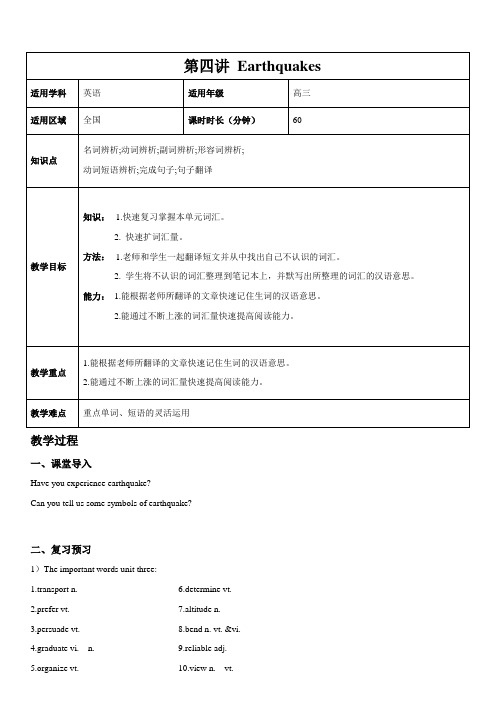
第四讲Earthquakes 适用学科英语适用年级高三适用区域全国课时时长(分钟)60知识点名词辨析;动词辨析;副词辨析;形容词辨析;动词短语辨析;完成句子;句子翻译教学目标知识: 1.快速复习掌握本单元词汇。
2. 快速扩词汇量。
方法: 1.老师和学生一起翻译短文并从中找出自己不认识的词汇。
2. 学生将不认识的词汇整理到笔记本上,并默写出所整理的词汇的汉语意思。
能力:1.能根据老师所翻译的文章快速记住生词的汉语意思。
2.能通过不断上涨的词汇量快速提高阅读能力。
教学重点1.能根据老师所翻译的文章快速记住生词的汉语意思。
2.能通过不断上涨的词汇量快速提高阅读能力。
教学难点重点单词、短语的灵活运用教学过程一、课堂导入Have you experience earthquake?Can you tell us some symbols of earthquake?二、复习预习1)The important words unit three:1.transport n. ______________2.prefer vt. ________________3.persuade vt. ______________4.graduate vi. n. __________anize vt. ______________6.determine vt. ____________7.altitude n. _______________8.bend n. vt. &vi. __________9.reliable adj. _____________10.view n. vt. ____________【答案】1.运送2.更喜欢3.说服、劝说4.毕业5.组织;成立6.决心7.态度;看法8.弯;拐角;使弯曲可信赖的;可靠的风景;观点2)The important phrases in unit three:1.ever since __________________2.be fond of __________________3.care about __________________4.change one’s mind ___________5.make up one’s mind __________6.give in _____________________7.as usual ____________________8.at midnight _________________【答案】1.从那以后2.喜爱;喜欢3.关心;忧虑;惦念4.改变主意5.下决心;决定6.投降;屈服;让步7.照常8.在午夜三、知识讲解翻译下面由本单元词汇所编成的故事要求学生在翻译过程中不会的词汇用横线标出(一)The passageA Horrible EarthquakeDirty water rose in well s and canal s before the earthquake. But no one judge d that an earthquake was coming. Suddenly, everything shook. It seemed as if the world was at an end. Millions of brick houses and a number of dam s were destroy ed. Railway track s became useless bar s. Pipe s in mine s burst and let out smelly steam. Huge crack s trap ped cyclist s everywhere.T he next day, this event was the headline or main title of all newspapers. With the reporter s giving an outline of the disaster, the whole nation was shock ed by the damage and the victim’s extreme suffering. People were moved when they read that the survivors comforted each other by saying “Congratulations! You survived!”. So they not only express ed their sympathy sincerely, but also organized together to help the victims right away. The injure d were rescue dand the dead were buried. The frighten ed survivors were dug out from under the ruin s and were offered shelter, fresh water and electricity. Thanks to people’s help, the loss was minimized.逐句翻译原文:______________________________________________________________________________________________ ___________________________________________________________________________________________________ ___________________________________________________________________________________________________ ___________________________________________________________________________________________________ ___________________________________________________________________________________________________ ___________________________________________________________________________________________________ ___________________________________________________________________________________________________ ___________________________________________________________________________________________________ ___________________________________________________________________________________________________ ___________________________________________________________________________________________________(二)重点知识总结与解析:1)The important words in this passage:lion n. _____________2.event n. ______________3.dirt n. ________________4.ruin n. vt. _____________5.suffering n. ____________6.injure vt. ____________7.destroy vt. ___________8.rescue n. & vt. _________ 9.trap vt. n. _______________10.disaster n. ______________11.bury vt. ________________12.reporter n. ______________13.damage n. & vt. __________14.frighten vt. ______________15.express vt. n. __________2)The important phrases in this passage1.right away __________2.as if _______________3.at an end ___________4.in ruins ___________________5.dig out ____________________6.a (great) number of __________(三)知识点讲解重点词汇知识点1 burst vt. & vi.(使)爆裂;(使)裂开;(使)炸开;突然出现;爆发n.突然破裂;爆发【教材原句】In the city, the water pipes in some buildings cracked and burst.(P26)在市内,有些建筑物的水管爆裂开来。
高中英语(人教版必修一)Unit4Earthquakes单元教案

中学英语(人教版)必修一第四单元教案Unit 4 Earthquake一.教学内容分析本单元话题为"地震",主要描写了1976年唐山大地震,各项语言活动也都是围绕地震绽开。
本单元共分八个部分。
Warming-up 部分通过两张图片引出话题"一旦地震发生,将会造成怎样的危害",为后面的主题作了一个热身运动。
Pre-reading 部分设置了两个开放性问题,目的是增加学生的生活常识,提高他们的应变实力。
这部分为接下来的阅读作了很好的铺垫,学生可通过套乱,参阅有关地震的书籍并运用一些生活常识来回答这两个问题。
Reading 部分具体描写了1976年唐山大地震的震前、震中和震后。
作者具体描述了地震来临前的一些不正常的自然现象与动物的反常表现;地震的来势汹汹并在顷刻间将整座城市夷为平地;震后人们英勇面对现实并与时实施抢救和重建工作。
Comprehending 部分包括三组练习,主要目的是为了帮助学生更好地理解Reading部分的文章。
Learning about Language 部分分为两个部分:Discovering useful words and expressions 和Discovering useful structures.第一部分要求学生在把握文章的基础上,驾驭重点词汇的词义与时用,这更留意培育学生运用上下文揣测词义的实力。
其次还对一些困难的数字读法进行了检测。
其次部分则结合文章学习定语从句。
Using Language 部分分为Reading,Writing and Speaking;Listening 和Writing。
Reading,Speaking 包括读一篇邀请函,写一份演讲稿和关于一套新唐山邮票的Little talk。
Listening 部分讲解并描述了一位地震生还者的故事,并依据听力材料进行正误推断和回答问题,旨在培育学生获得细微环节的实力,并通过听来仿照标准的语音和语调。
人教版高中英语必修1《Unit 4 Earthquakes》教案
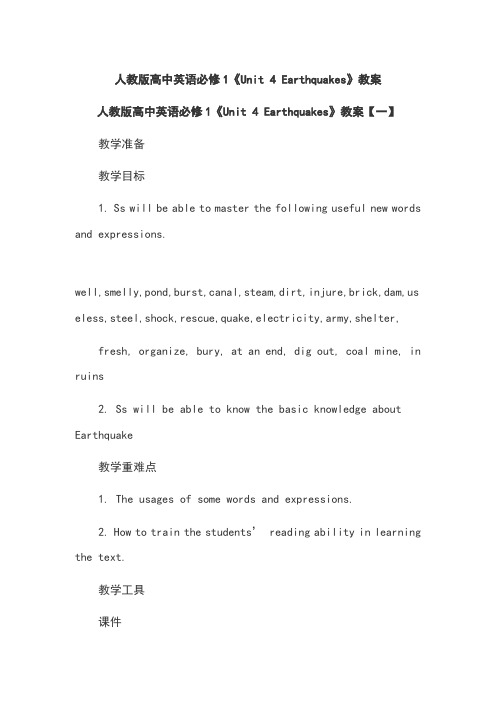
人教版高中英语必修1《Unit 4 Earthquakes》教案人教版高中英语必修1《Unit 4 Earthquakes》教案【一】教学准备教学目标1. Ss will be able to master the following useful new words and expressions.well,smelly,pond,burst,canal,steam,dirt,injure,brick,dam,us eless,steel,shock,rescue,quake,electricity,army,shelter, fresh, organize, bury, at an end, dig out, coal mine, in ruins2. Ss will be able to know the basic knowledge about Earthquake教学重难点1. The usages of some words and expressions.2. How to train the students’ reading ability in learning the text.教学工具课件教学过程Step I lead-inLet students see a short video and answer the questions1.What happened in the video? Earthquakes2.How do you feel seeing the plots(情节)? Students’discussion.Step II Fast reading1. What is the passage mainly about? InTangshan ,earthquakes happened on July 28th 19762. Skim the text and answer the questionsThe type of writing (写作体裁)Narrative writingTopic sentence of Paragraph 1Sentence 1Topic sentence of Paragraph 2Sentence 2Topic sentence of Paragraph 3Sentence 1Topic sentence of Paragraph 4Sentence 1Step III Detailed readingAsk students to read the text carefully and answer the questionsTask1: What were the nature signs of the coming earthquake?(选择)Para 11.Water in well( G )2. Well walls(D )3.Chickens &pigs(F )4 .Mice (A) 5.Fish(E ) 6. Bright lights( B) 7. Water pipes(C )A. Ran out of fieldsB. in the skyC. Cracked and burstD. Deep cracksE. Jumped out of pondsF. Too nervous to eatG. Rose and fell, fell and roseTask 2 Fill in the blanksMain IdeaDetailsDamage caused byearthquakePara 2-3At _____ am, the __________ earthquake of the 20th century began ._______ burst from holes in the ground.Hard hills of the rock became rivers of ____.________ covered the ground like red autumn leaves.Two _______ and most of the bridges fell.The railway tracks were now _________pieces of _______.______ now filled the wells instead of water.Water,food,and ______________ were hard to get.The reconstruction(重建) after the earthquakePara 41. The army _____________2. Workers ____________for survivors.3._____________was taken to the city.Details:1. At 3:42 am, the greatest earthquake of the 20th century began.2. Steam burst from holes in the ground.3. Hard hills of the rock became rivers of dirt.4. Bricks covered the ground like red autumn leaves.5. Two dams and most of the bridges fell.6. The railway tracks were now useless pieces of steel.7. Sand now filled the wells instead of water.8. Water, food, and electricity were hard to get.Step IV consolidation (当堂巩固)Let students fill the blanks according to the passageStrange things were happening in the countryside of northeast Hebei. For three days the water in the village wells kept rising and 1_________(fall). Farmers noticed that the well walls had deep cracks 2___________ them. A smelly gas came out of the cracks. In 3_________farmyards, the chickens and even the pigs were too nervous 4__________(eat). 5_________(mouse) ran out of the fields looking for places 6________(hide). Fish jumped outOf their bowls and ponds. At about 3 am on July 28,1976, some people saw bright lights 7_________ the sky. The sound of planes could 8________(hear) outside the city of Tangshan even 9_________ no planes were in the sky.In the city, the water pipes in some buildings cracked and burst. But the one million people of the city, ________thought little of these events, were asleep as usual that night.1 falling2 in3 the4 to eat5 mice6 to hide 7in 8 be heard 9when 10 who这部分目的是让学生进一步巩固课文的内容。
高中英语必修一人教版:Unit+4+Earthquakes+教学案1.doc
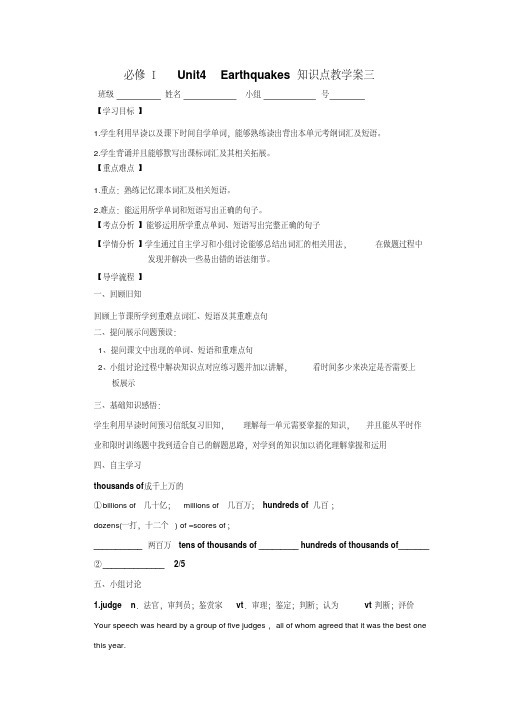
必修ⅠUnit4 Earthquakes知识点教学案三班级姓名小组号【学习目标】1.学生利用早读以及课下时间自学单词,能够熟练读出背出本单元考纲词汇及短语。
2.学生背诵并且能够默写出课标词汇及其相关拓展。
【重点难点】1.重点:熟练记忆课本词汇及相关短语。
2.难点:能运用所学单词和短语写出正确的句子。
【考点分析】能够运用所学重点单词、短语写出完整正确的句子【学情分析】学生通过自主学习和小组讨论能够总结出词汇的相关用法,在做题过程中发现并解决一些易出错的语法细节。
【导学流程】一、回顾旧知回顾上节课所学到重难点词汇、短语及其重难点句二、提问展示问题预设:1、提问课文中出现的单词、短语和重难点句2、小组讨论过程中解决知识点对应练习题并加以讲解,看时间多少来决定是否需要上板展示三、基础知识感悟:学生利用早读时间预习信纸复习旧知,理解每一单元需要掌握的知识,并且能从平时作业和限时训练题中找到适合自己的解题思路,对学到的知识加以消化理解掌握和运用四、自主学习thousands of成千上万的①billions of 几十亿;millions of 几百万;hundreds of 几百;dozens(一打,十二个) of =scores of;___________ 两百万tens of thousands of _________ hundreds of thousands of_______ ②______________ 2/5五、小组讨论1.judge n.法官,审判员;鉴赏家vt.审理;鉴定;判断;认为vt判断;评价Your speech was heard by a group of five judges,all of whom agreed that it was the best one this year.Judging by/from从...上看;根据...判断,置于句首作状语,v-ing形式不受主语的限制,构成独立成分。
最新精品人教版新课标必修一Unit4Earthquakes单元学案(4课时)

Unit 4 Earthquakes-单元导学案Period 1 Warming up and Reading comprehension课前自主学习方案重点单词1 (adj.) 极度的(adv.)极度地2 (n.)民族;国家;国民(adv.)民族的;国家的;全国的3 (n,) 污垢(adj.) 脏的4 (n.)苦难;痛苦______(v.)遭受(n.)患病者;受难者5 (v.)损害(n.)6 (vt.) 毁坏(n.)7(n.) 电;电流(adj.)靠电来工作的(adj.)与电有关的8 (n.)祝贺;(复数)贺词(v.)祝贺9 (vt.)使惊吓;吓唬_____(adj.)令人恐惧的(adj.)受惊的;受惊吓的重点短语1 right 立刻;马上2 too…太…… 而不能……3 think of 评价不高4usual 像往常一样5 as好像6 an end 结束;终结7 cut 穿过;贯穿8 ruins 成为废墟9 number of ……的数量10 instead 代替11 dig掘出;发现12 (great) number of 许多;大量的语篇导读Lead-inⅠ.what natural disasters have you heard of?II.Which disaster may cause the worst damage? Have you ever experienced an earthquake?_____________________________________________________________________Ⅲ.Discussion:How much do you know about an earthquake?1 What do you think will happen before an earthquake?_____________________________________________________________________ 2 What shall we do if an earthquake happens when we are at school?_____________________________________________________________________ 3 Can we stop earthquakes?_____________________________________________________________________ 4 What can we do after earthquakes?_____________________________________________________________________课文佳句背诵与仿写(旨在培养对难句的理解和写作能力)【原句】But the one million people of the city, who thought little of these events, were asleep as usual that night. 但是,唐山市的一百万居民几乎都没有把这些情况当一回事,当天晚上照常睡着了。
人教版高中英语必修1教案Unit 4 Earthquakes
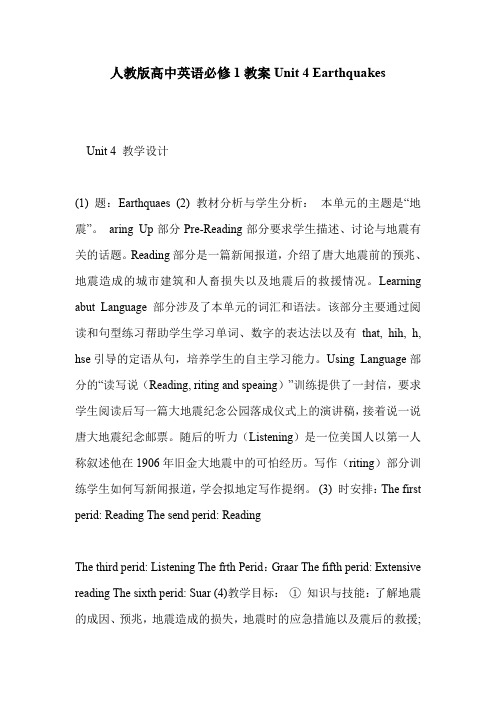
人教版高中英语必修1教案Unit 4 EarthquakesUnit 4 教学设计(1) 题:Earthquaes (2) 教材分析与学生分析:本单元的主题是“地震”。
aring Up部分Pre-Reading部分要求学生描述、讨论与地震有关的话题。
Reading部分是一篇新闻报道,介绍了唐大地震前的预兆、地震造成的城市建筑和人畜损失以及地震后的救援情况。
Learning abut Language 部分涉及了本单元的词汇和语法。
该部分主要通过阅读和句型练习帮助学生学习单词、数字的表达法以及有that, hih, h, hse引导的定语从句,培养学生的自主学习能力。
Using Language部分的“读写说(Reading, riting and speaing)”训练提供了一封信,要求学生阅读后写一篇大地震纪念公园落成仪式上的演讲稿,接着说一说唐大地震纪念邮票。
随后的听力(Listening)是一位美国人以第一人称叙述他在1906年旧金大地震中的可怕经历。
写作(riting)部分训练学生如何写新闻报道,学会拟地定写作提纲。
(3) 时安排:The first perid: Reading The send perid: ReadingThe third perid: Listening The frth Perid:Graar The fifth perid: Extensive reading The sixth perid: Suar (4)教学目标:①知识与技能:了解地震的成因、预兆,地震造成的损失,地震时的应急措施以及震后的救援;掌握和运用本单元出现的新词汇和短语以及数字的表达法;熟练运用that, hih, h, hse引导的定语从句;学会写英新闻报道,拟订写作提纲。
②过程与方法:在学习阅读部分时,可以根据教学的需要和教学班级的实际,从不同的角度设计目的明确的任务。
阅读材料提及了很多孩子失去双亲成为孤儿,矿工在地震中的遭遇。
人教版高一必修1Unit4Earthquakes教案
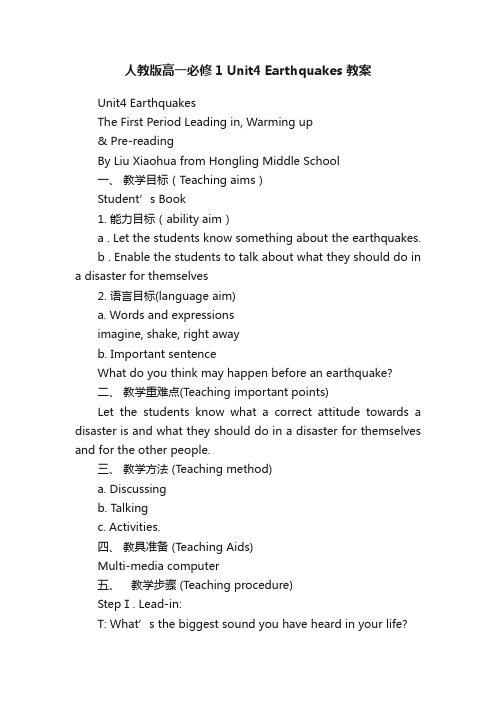
人教版高一必修1 Unit4 Earthquakes 教案Unit4 EarthquakesThe First Period Leading in, Warming up& Pre-readingBy Liu Xiaohua from Hongling Middle School一、教学目标(Teaching aims)Student’s Book1. 能力目标(ability aim)a . Let the students know something about the earthquakes.b . Enable the students to talk about what they should do ina disaster for themselves2. 语言目标(language aim)a. Words and expressionsimagine, shake, right awayb. Important sentenceWhat do you think may happen before an earthquake?二、教学重难点(Teaching important points)Let the students know what a correct attitude towards a disaster is and what they should do in a disaster for themselves and for the other people.三、教学方法 (Teaching method)a. Discussingb. Talkingc. Activities.四、教具准备 (Teaching Aids)Multi-media computer五、教学步骤 (Teaching procedure)StepⅠ. Lead-in:T: What’s the biggest sound you have heard in your life?( the sound of the wind that blew in a winter night; the nose when planes take off; the sound of trains; the sound of thunder…..) But did you once hear the sound that the heaven falls and the earth crack. In Chinese it is 天崩地裂?If there is a sound like this what is it? What will happen?Today we’ll learn somethi ng about earthquakes. Can you imagine how terrible it is?First let the students answer the following question.Which of the following may cause people the greatest damage?Earthquake, Typhoon, Flood, DroughtVarious answers are possible. Students should give reasons to support their answers. All of them are natural disasters, they have something in common, at the same time, they have many differences.Let the students know something about the earthquake. (slides)T: How does the earthquake occur?Then show the film to the students. ( film about the earthquake )T: When some plates of the earth move suddenly, an earthquake happens. Many earthquakes begin under the sea. In fact, earthquakes may happen near high mountains.During an earthquake, the shaking make rocks rise suddenly and even cracks open. Houses fall, people are killed or hurt, and sometimes the whole villages or cities are destroyed. Some villages even disappear completely.Step Ⅱ. TalkingT: Earthquakes are disasters to everybody. Now look at the two pictures of Tang Shan and San Francisco. Can you describewhat you see in the pictures?(Show two pictures to the students and tell the students they are today’s Tangshan and San Francisco. But many years ago some big earthquakes hit these two beautiful cities.)1. Show the pictures of San Francisco to the students and let them describe today’s San Francisco and then let them know what happened in San Francisco in 1906(From the picture of San Francisco, we can see it is a very big city. There are many tall buildings thickly standing on the earth. And the population of the city is very large.)2. Show the pictures of Tangshan to the students and let them describe today’ Tangshan and then let them know what happened in Tangshan in 1976.( Today’ Tangshan is a beautiful city. It has beautiful gardens, broad roads and some tall buildings.)T: But, what will happen if there has been a big earthquake in these two cities? Work in groups and discuss it. Then I’ll ask some of you to say out your opinion.( After the terrible quake, everything is destroyed, what we can see is fallen buildings and dead bodies. The policemen, the soldiers and some other volunteers are rescuing the people trapped in the ruins….)T: Right, now let’s see a film.(Let the students see a film about Tangshan Earthquake.) (film)T: After the earthquake the city of Tangshan became…..Let the students discuss what they saw. And then talk about the pictures in their own words.The house….The fire….The bridge….The road…The police an d the volunteers….The people…..( Tangshan Earthquake happened on July 28, 1976.It was the greatest earthquake of the 20th century in China. Before the earthquake, many strange things happened, but people thought little of them. Such a great number of people died during the earthquake, because the quake happened while they were sleeping. The number of people who were killed or injured reached more than 400,000. And all the traffic was almost destroyed after the quake. Thousands of thousands of people became homeless in a short time. Many soldiers were sent to Tangshan to rescue the survivors after the earthquake.Let the students talk about the damage caused by earthquakesUsing the following words and phrases:shake, break, fall down onto, hurt, destroy, h omeless, die…..Step Ⅲ. Pre-readingT: But we can avoid or at least reduce the loss caused by earthquakes. And we can foretell it.Do you know what would happen before an earthquake?Can we do something to keep ourselves safe from earthquakes?( 1. There is often a great sound.2. Animals may be too nervous to eat.3. Maybe there are bright lights in the sky.4. a smelly gas may come out of the well.5. In the city the water pipes in some buildings crack and burst.6. Scientists have studied earthquakes and make maps that show the “ earthquake belts”. In areas in these belts, it is possible for earthquakes to happen. In these areas we can build strong houses to fight against earthquakes.)Discussion & Activities1. Show some pictures to the students andlet them discuss.Let the students look at them and decidewhat situation may happen before anearthquake.2. Then fill in the missing wordsaccording to the pictures.a. The water in the wells ____ and____. And some deep ______could be seen in the well walls. A ______gas came out the cracks.b. Mice ran out the Fields ___________places to hide. Fish _________out of bows and ponds.c. The chickens and even pigs were ______ nervous _____eat. The dog was ________ loudly again and again.d. People could see _______lights in the sky.3. Let the students discuss if they have ever experienced an earthquake.Step Ⅳ Discussion & ActivitiesT: What do you think may happen before an earthquake?(Before an earthquake, animals will become nervous. Cow, pigs,, horses and dogs will be upset. And people can see mice running about. If the earthquake happens during winter, people can even see snakes.)T: Have you ever experienced an earthquake?Let the students discuss and then talk about it.Step Ⅴ HomeworkPreview Reading material and then do exercise on page 27. 1-3 ( in comprehending )。
高中英语必修一Unit4《Earthquakes》教学设计全面版
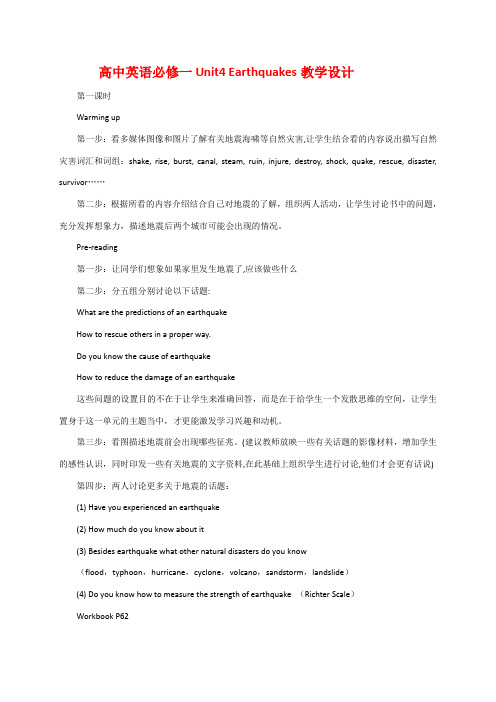
高中英语必修一Unit4 Earthquakes教学设计第一课时Warming up第一步:看多媒体图像和图片了解有关地震海啸等自然灾害,让学生结合看的内容说出描写自然灾害词汇和词组:shake, rise, burst, canal, steam, ruin, injure, destroy, shock, quake, rescue, disaster, survivor……第二步:根据所看的内容介绍结合自己对地震的了解,组织两人活动,让学生讨论书中的问题,充分发挥想象力,描述地震后两个城市可能会出现的情况。
Pre-reading第一步:让同学们想象如果家里发生地震了,应该做些什么第二步:分五组分别讨论以下话题:What are the predictions of an earthquakeHow to rescue others in a proper way.Do you know the cause of earthquakeHow to reduce the damage of an earthquake这些问题的设置目的不在于让学生来准确回答,而是在于给学生一个发散思维的空间,让学生置身于这一单元的主题当中,才更能激发学习兴趣和动机。
第三步:看图描述地震前会出现哪些征兆。
(建议教师放映一些有关话题的影像材料,增加学生的感性认识,同时印发一些有关地震的文字资料,在此基础上组织学生进行讨论,他们才会更有话说)第四步:两人讨论更多关于地震的话题:(1) Have you experienced an earthquake(2) How much do you know about it(3) Besides earthquake what other natural disasters do you know(flood,typhoon,hurricane,cyclone,volcano,sandstorm,landslide)(4) Do you know how to measure the strength of earthquake (Richter Scale)Workbook P62(这部分听力材料的内容刚好是针对以上话题的,关于地震产生的原因和影响)第一步:先让学生猜测练习一中的陈述哪些是正确的,哪些是错误的。
高考英语总复习 Unit 4 Earthquakes教学案 新人教版必修1-新人教版高三必修1英语教
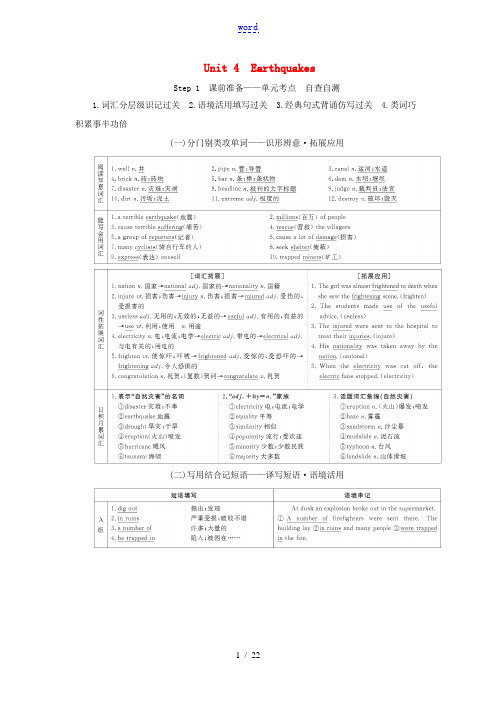
Unit 4 EarthquakesStep 1 课前准备——单元考点自查自测1.词汇分层级识记过关2.语境活用填写过关3.经典句式背诵仿写过关4.类词巧积累事半功倍(一)分门别类攻单词——识形辨意·拓展应用(二)写用结合记短语——译写短语·语境活用(三)仿写活用练句式——经典句型·仿写背诵Step 2 课堂探究——核心考点点点突破1.重点难点考点学通练透2.归纳总结拓展开阔视野3.方法规律技巧权威点拨4.面面俱到打创高效课堂第一时段Warming up & Reading1.burst vi.爆裂;爆发;突然迸发;冲;闯n.突然破裂;爆发[教材原句] In the city, the water pipes in some buildings cracked and burst.在市内,有些建筑物里的水管出现裂缝并爆裂开来。
(1)burst in/into 闯入;突然破门而入(2) ⎭⎪⎬⎪⎫burst out crying/laughing burst into tears/laughter 突然哭起来/笑起来 burst with anger 勃然大怒单句语法填空①On hearing the news, Mary burst ________ laughter while Lucy burst out ________(cry).②Last night the room ____________(burst) into but nothing was taken away.[答案] ①into; crying ②was burst2.ruin n .[U ]毁灭;毁坏;崩溃;[常用复数]废墟;遗迹 vt.(使)毁坏;成为废墟[教材原句] In fifteen terrible seconds a large city lay in ruins .在可怕的15 秒内,一座大城市成了废墟。
新课标高一必修1英语教案Unit4Earthquakes(简案)

新课标高一必修1英语教案Unit4Earthquakes(简案)第一篇:新课标高一必修1 英语教案Unit 4 Earthquakes (简案) 新课标高一必修1 英语教案Unit 4 Earthquakes(简案)Teachingplanforunit4EarthquakesTeachingaimsanddemands:1.Topic:Basicknowledgeofearthquakes;howtoprotectoneselfandhelp theothersindisastersefulwordsandexpressions:shake,well,rise,smelly,pond,pipe,burst,canal,steam,dirt,ruin,i njure,destroy,brick,dam,useless,steel,shock,quake,rescue,electrici ty,disaster,army,organize,bury,coal,shelter,fresh,percent,speech,j udge,honour,prepare;rightaway,atanend,digout,bringin,anumberof3.Functions:Talkingaboutpastexperiences:Iwillneverforgetthedaywhentheearthquaketookplace.Thetim ewas5:15intheafternoonandIwasdrivingalongtheroad.Sequence4.Grammar:Theattributiveclause由that,which,who,whose引导的定语从句Thenumberofpeoplewhowerekilledorinjuredreachedmoreth an400,000.ItwasheardinBeijingwhichisonehundredkilometersaw ay.workersbuiltsheltersforsurvivorswhosehomeshadbeendestroy ed.Teachingprocedures:Period1.Step1.warmingupSsdiscussandanswersomequestions:.whichofthefollowingmaycausepeoplethegreatestdamage?A.earthquakeB.typhoonc.floodD.drought2.Imagineyourhomebeginstoshakeandyoumustleaveitrighta way.youhavetimetotakeonlyonething.whatwillyoutake?why?Step2.Pre-readingSsdiscussandanswer:.Doyouknowwhatwouldhappenbeforeanearthquake?2.whatcanwedotokeepourselvessafefromanearthquake?3.DoyouknowanythingaboutTangshanEarthquakein1976?Step3.Reading.Skimmingandfindtheanswerstothefollowingquestions:a.whathappened?b.whenandwheredidithappen?2.Ssreadagainandfillinthefollowingform:TimewhathappenedBeforetheearthquakewells:Animals:Lightsandsound:waterpi pes:whiletheearthquakeHouses,roadsandcanals:Hardhillsofrock: Thelargecity:Thepeople: AftertheearthquakeHospitals,factoriesandbuildings:Theground: Dams:Railwaytracks:Animals:wells:3.Ssreadthewholepassageagainandgetthemainideasofeachp art:Part1.ThenaturalsignsofacomingearthquakePart2.ThedamageofthecityaftertheearthquakePart3.ThehelptothesurvivorsprehendingSsfinishEx1and2onpage27.Step5.Assignment.Surftheinternetandgetmoreinformationabouttheearthquak e.2.Retellthetext.Period2.Step1.warmingup.Sssharemoreinformationabouttheearthquake.2.AsksomeSst nguagepoints.lie–lay-lain:tobe,remainorbekeptinacertainstate处于某种状态Thevillagelayinruinsafterthewar.Thesemachineshavelainidles incethefactoryclosed.2.inruins:severelydamagedordestroyed毁坏anearthquakeleftthewholetowninruins.Hiscareerisinruins.3.n umber:aquantityofpeopleorthings数目;数量Thenumberofpeopleapplyinghasincreasedthisyear.wewerefif teeninnumber.anumberof:alotofIhaveanumberofletterstowrite.Alargenumberofpeoplehavea pplied.4.injure:tohurtoneself/sb./sth.physically受伤Hefelloffthebicycleandinjuredhisarm.5.reach:toachieveorobt ainsth.达成;达到;获得you’llunderstanditwhenyoureachmyage.Atlastwereacheda decision.6.rescue:anactofrescuingorbeingrescued搭救;解救Arescueteamistryingtoreachthetrappedmines.Rescue:tosave orsetfreefromharm,indanger,orloss解救;救出Therescuedthemanfromdrowning.7.trap:inaplacefromwhich onewantstoescapebutcannot困住;陷于绝境Theywe retrappedintheburninghotel.8.all…not…=notall…:so mebutnotall一些;但不是全部Notallthegirlsleft.=onlysomeofthemleftearly.Notallthechildr enarenoisy.=Someofthechildrenarenotnoisy.全部否定应用:noneof…Noneofuswereallowedtogothere.Noneofthesereportsisveryh elpful.Step3.learningaboutlanguage.SsfinishEx1,2and3onpage27and28.2.Teachercheckstheansw erandgivetheSssomehelpiftheyhavesomedifficulty.Step4.assign ment.Finishwb.Ex.1onpage63.2.Sstrytoremembertheusefulwordsa ndexpressionsbyhearts.Period3Step1.warmingupSsreadthepassageagainandtrytofindthesentenceswithattribu tiveclauses.e.g.workersbuiltsheltersforsurvivorswhosehomeshad beendestroyed.Step2.Attributiveclause.GiveSsmoresentencesandlettheSstofindthestructuresofthea ttributiveclause.2.Ssdosomeexercisesabouthowtousethat,which, whoorwhose.3.SsfinishEx2onpage28.Somematerialsaboutattribu tiveclause:关系代词引导的定语从句关系代词所代替的先行词是人或物的名词或代词,并在句中充当主语、宾语、定语等成分。
新人教版高一英语必修1 unit4 Earthquake单元精品教案

人教版高一英语必修unit4 Earthquake全单元教案Warming-up & ListeningTeaching goals:1. Get a general idea of earthquakes and some other natural disasters;2. Train students’ listening ability and try to improve their pronunciation;3. Know the damage that an earthquake and other disasters could bring about and ways to reduce the losses of an earthquake.Teaching important points:Train the students’ listening ability and improve pronunciation. Teaching aids:A tape recorder; the blackboard; CIA课件Teaching procedures:Step1. Lead-in----video of different natural disastersT: Our hometown is a place full of a kind of disasters. What is it?Typhoon, earthquake, hurricane tsunami, flood, tornado, drought…are all called natural disasters.Q. what damage will they bring about?---- everything in ruins/ death/ losses…Step2. Introduction of Earthquakes (Let students get the general idea of earthquake)Q: what do you know about earthquake? What causes quakes and where do they often happen? How to predict an earthquake? Q: How to avoid being hurt?? ----through gamesQ: Have you heard of any land earthquakes?----Two pictures in warming-up: Tangshan Earthquake and San Francisco Earthquake.Q: What do you know about these two earthquakes?Step3: Listening1. Pre-listening----brief introduction of San Francisco EarthquakeQ: When did the quake happen?---- 1906Q: what damage did bring about?---- About 700 people died in the earthquake and the fires. And as many as 250,000 people lost homes…2. While-Listening----according to the exercises in the text book3. Post-listening----How can we reduce the damage of earthquake? What can we do?Step4: Homework ---- preview the reading “A Night the Earth didn’t Sleep” and learn new words of this unitReadingTeaching goals:1. Target language 目标语言Learn and master the new words and expressions in this period.2. Ability goals 能力目标Train the students’ reading and speaking ability.Train the students’ ability to use the Internet to search for some useful information.Train the students’ ability to cooperate with others.Teaching important points:Train the students’ reading ability—skimming and scanning.Teaching difficult points:Describe the disasters.Teaching aids:CIA课件Teaching procedures:Step1. Lead-inT: We have a visit to the museum of natural disasters, and you have learned about some brief introduction of most disasters. Today, I want to show you round the earthquake department, and I hope you will like it and learn some useful knowledge. Now let’s go.T: At the very beginning, I want to know how much you know about an quake.Q1: What would you take with you if a quake happened?Q2: The best way to save yourself is to know there will be a quake before it happens. What kind of signs can tell you that there is a quake?Q3: What kind of damage can an earthquake cause?S: buildings are destroyed; people are killed; families are broken…T: Let’s have a look at some pictures of such terrible site. (Pictures of quakes)T: (The last picture is monument of Tangshan quake.) Do you know what this is?Step2. Pre-ReadingT: 30 years ago, on the day July, the 28th, a terrible disaster suddenly happened, and the beautiful Tangshan was removed from the map. This is Tangshan quake. Does any body know something about Tangshan quake?T: Let’s read a news report about the famous quake.Step3. While-readingI. Skimming & scaringGet the students comprehend the passage quickly and accurately, and meanwhile help the students to form a good habit of reading.T: First please skim the passage fast to obtain/ get a general understanding of the whole passage. And underline the answers to the following questions. II. While reading, divide the whole passage into 3parts and find out the main idea of each part.Para.1 before the quakePara.2-3 during the quakePara.4 after the quakeII. Careful-readingRead the passage again and try to get more detailed information.T: Now let’s read the passage again and find more information. Join the correct parts of the sentences. (Turn to page 27, ex1)T: Now you have read the passage carefully, please put the sentences in order. Number each of these things during the Tangshan quake.(Turn to page 27, ex2) T: here are some more work for you. You can work in groups.T: Let’s watch some pictures, and comparing the old Tangshan, the Tangshan after quake, and the new Tangshan we see today.Step 4 Post-reading (discussing)T: After read the news report, and see so many pictures, what impresses you most? Why?Or what do you learn from such a disaster?(Self-rescue, environment protection, rebuilt, love and help)I: self-rescue (a video game)T: When in a quake, if you know some self-rescue skills, you may probably save yourself. If you want to know some of the skills, click here. (Link to the index)Let’s do little game to see how much you know about self-rescue.II. What did they suffer and feel?T: Can you understand what they suffer and what they feel after such a disaster?T: If you were one of the rescuers 30 years ago, what could you say and what can you do to comfort them? Or how could you help them?III. RebuildingT: we see that the new Tangshan has been set up. What is needed to rebuild Tangshan.IV: environment protectionT: nowadays there are more disasters than before. One of the reasons is that we pay more attention to our economy development than the earth we live. Look at these pictures. What can we students do to save the earth?T: Though the disasters destroy buildings, people’s lives, but it can not destroy the love among us.Step 5 Homework1. Find more news reports about earthquake.2. Write a piece of news about Tangshan. You can use the information in the passage.News WritingTeaching aims:1. Get students to learn how to write news;2. Train students the ability to cooperate with each other and to search for information;3. Learn more about Tangshan earthquake and honor the people of Tangshan.Teaching difficulties:1. How to make students learn writing in a more practical and effective way;2. How to help students understand the tips for writing. Teaching procedure:Step 1: Lead-in----The 30th anniversary of Tangshan earthquake (news)T: We have learnt the Tangshan earthquake. When did it happen? How many people died during the earthquake?Step 2: Prese ntation of students’ news writing(homework of last class) ----point out the mistakes in news writing according to three aspects T: You have finished the news writing of Tangshan earthquake, and now it’s time for you to show your project. Others have to point out the mistakes in his or her writing according to three aspects.----Three aspects: headline; content and languageT: What do you think of his or her writing? Is it a proper news writing? What have you done before your writing?Step 3: Tips for writing1. Preparation ---- an outlinePreparation: Choose a topic; decide what you want to say about the topic; Organize your ideas and write clearly.Outline: A headline; a list of main ideas; A list of important details 2. Headline⑵ characteristics of headlinesQ: what’s the characteristic of headlines?⑶ practice ---- write headlines for the following news according to the picture and information givenFlood relief efforts----The death toll on the Chinese mainland from Typhoon Kaemi has risen to 32, with at least 65 still missing. Local governments are sparing no efforts to carry out relief work.PLA celebrates 79th birthday----The Chinese People's Liberation Army is 79 years old, and the Defense Ministry has held a reception to celebrate.Quake hits Indonesian island----A moderate earthquake has struck near Indonesia's Nias island off northern Sumatra. The quake, with a magnitude of 5.6 struck just before 8.30 am, and was centered under the Indian Ocean, about 55 kilometers northwest of the main town on the island, Gunung Sitoli.Railway's impact on Tibetans----The Railway brings the remote Qinghai-Tibet plateau closer to the rest of the world. With people able to move in and out of the region more easily and the economic benefits the railway brings, the lives of Tibetans will never be the same again.3. Content---- How to organize your content of news⑴ Tips----Be clear of the content you want to mention; List your ideas; Write the most important thing in the beginning and the less ones in the following⑵ Practice----write the beginning of news according to the information and picture givenA woman;rifts on the wall;earthquake measuring 5.1degrees;Wen'an County, north China'sHebei Province;11:56 a.m. Tuesday, July 4, 2006;the quake’s epicenter --about 110kilometers from Beijing and 80 kilometers from Tianjin;casualty –not knownA woman points at the rifts on the wall of a village school after an earthquake measuring 5.1 degrees on the Richter scale jolted Wen'an County, north China's Hebei Province at 11:56 a.m. (Beijing Time) Tuesday, July 4, 2006. The quake was a shallow-focus one, with its epicenter being around 110 kilometers from Beijing and about 80 kilometers from Tianjin. No casualty was reported at press time.4. LanguageTips----clear; objective; brief; accurate; written English…Step 4: Appreciation of newsRadio----VOA news: “Aid for tsunami victims”News report----“Tangshan Quake 30th Anniversary”Step 5: Improvement of students’ writing ----Improve your news writing about Tangshan earthquakeUsing Language----Reading, writing and speakingTeaching Aims:1. Enable the students to make a speech2. Let the students enjoy some famous speechesTeaching Important and Difficult Points:1. Review something about disasters2. How to make a speechTeaching Methods:1. Individual work2. group workTeaching Aids: Computer, blackboardTeaching Procedures:Step 1 Lead-in(Teacher shows a series of pictures of some disasters on the screen, let the students talk about their feelings or anything they feel about the pictures.)(The pictures are: fire, hurricane, t yphoon, tsunami, earthquake…)T: In this unit, we learn a lot about disasters. We know disaster is not a good thing to us. We often feel sad or sorry if a disaster happens. T: Right now, you have just seen some of the disasters. Do you feel worried about these refugees?Ss: Yes.Step 2 DiscussionT: Yes, everybody will feel sorry for them. But who is the most worried people when a disaster happens?Ss: families and friends / government and president / ……..T: Suppose, there is an earthquake happen somewhere in China, and you have a friend happens to be there. You are very worried. What will you do when you hear that an earthquake happens there? (Let the students discuss with their partner)Ss: I will feel very worried. I will make sure my friend is Ok as soon as possible. I will make a call to see if he is Ok.T: Again, suppose you are a president of a country, and an earthquake happens in your country. What will you do?Ss: It is my duty to comfort the refugees and the society. So first I will make a live speech to the whole country, telling my people that I know it and I will try my best to organize the rescue work and the rebuilding work after the earthquake.T: Yes, you are very clever. In fact, a real president will do just as you said ----- to make a speech. Now just let’s listen to a real speech madeby President Bush after a big earthquake hit India on the first day of New Year.(Play the tape record for the students)Step 3 SpeechT: Right now we’ve just listened to a speech made by Presid ent Bush. Do you know something about how to make a speech? Can you tell me when should we make a speech?Ss: a speech competition / election / the beginning of a new year / the opening of some activity / anniversary…..T: Yes, people need to make speeches at those times. Then do you know how to make a speech? What should we contain when we make a speech?Ss: Introduction: Give a strong first impression & preview your speech Body: Explain your ideas and support themConclusion: Review your speech and leave a lasting finalimpression.Step 4 TextT: It seems that you know a lot about making a speech. I remember we say that we may need to make a speech when it is some important anniversary. T: You know 2006 is the 30th anniversary of Tang Shan Earthquake. Here is an invitation, inviting you to make a speech about it. You can look at the letter on your text book.T: You can include these points in your speech;1. thank Mr Zhang Sha and the city government for inviting you to speak2. thank the visitors, especially the survivors3. thank those who worked hard to save survivors4. list some of the things the workers did to help the survivors5. thank those who worked hard to build the city6. describe your feeling about the city, which is known as the “Brave City of China”.7. encourage the people to be always proud of their city.8. thank the visitors for listening to your speech.T: So try to give a speech, using these points. Now I will give you 5miniutes to finish the speech.(after 5 minutes)Step 5 Speech contestT: Times up. Have you finished your speech? Ok, I think it is time for us to hold a speech contest. We have 4 groups in our class. Each group, please choose one contestant to represent your group and join the class speech contest. …, …and … will be the judges.(Ask each group to give a speech and the chosen judges will choose the winner.)T: Congratulations to the winner! Step 6 ConclusionT: In this lesson we learned a lot about speech and we also made a speech by ourselves. So do you know how to make a speech now?T: At the end of the class, let’s enjoy a very famous speech in human history.(Abraham Lincoln Gettysburg Address)六.评估与反馈----according to the “Summing Up” in unit 4。
Earthquakes导学案Unit4英语人教必修一.docx
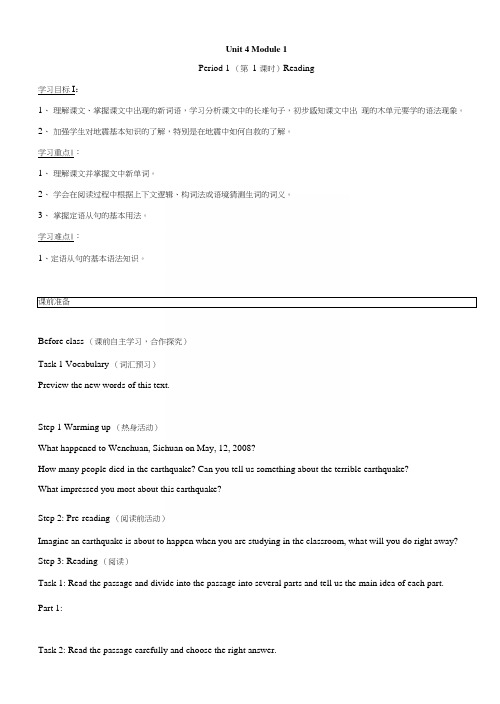
Unit 4 Module 1Period 1 (第1 课时)Reading学习目标I:1、理解课文、掌握课文中出现的新词语,学习分析课文中的长难句子,初步感知课文中出现的木单元要学的语法现象。
2、加强学生对地震基本知识的了解,特别是在地震中如何自救的了解。
学习重点|:1、理解课文并掌握文中新单词。
2、学会在阅读过程中根据上下文逻辑、构词法或语境猜测生词的词义。
3、掌握定语从句的基本用法。
学习难点|:1、定语从句的基本语法知识。
课前准备Before class (课前自主学习,合作探究)Task 1 Vocabulary (词汇预习)Preview the new words of this text.Step 1 Warming up (热身活动)What happened to Wenchuan, Sichuan on May, 12, 2008?How many people died in the earthquake? Can you tell us something about the terrible earthquake?What impressed you most about this earthquake?Step 2: Pre-reading (阅读前活动)Imagine an earthquake is about to happen when you are studying in the classroom, what will you do right away? Step 3: Reading (阅读)Task 1: Read the passage and divide into the passage into several parts and tell us the main idea of each part. Part 1:Task 2: Read the passage carefully and choose the right answer.1.The title of the text "A Night The Earth Didn't sleep" means _ ______ ・A.the earth was wide awake all night longB.people on the earth couldn't fall asleep that nightC.the earth shook like crazy that nightD.animals on the earth would not sleep that night2.The meaning of "lay in ruins "in Paragraph 2 is _________ .A.was totally destroyedB. lay in bedC. was hurtD. was out of control3・ People in Tangshan were asleep as usual that night because they ______・A.could never imagine there would be a terrible earthquakeB.thought they had prepared well for the earthquakeC・ thought it was easy to experience an earthquakeD・ thought sleeping was the most important thing no matter what happened4.Which of the following is NOT true according to the text?A. Tangshan earthquake was the greatest earthquakes of the 20,h century in China・B. 75% of the factories and buildings and 60%of the homes in Tangshan were goneC.The railway tracks were destroyed completely.D.Tens of thousands of cows would never give milk again.Task 3: Fill in the following sentences:1、Before the earthquake:A.The water in the wells ______ and fell and well walls had deep _____ ・B.Chickens and pigs were ______ ・ Mice ran out of the fields and fish jumped out of theponds・C.People saw ____ in the sky and heard the sound of planes and the water pipes in somebuildings cracked and ______ ・2、During the earthquake:A. At 3:42a.m. everything began to ________ • Then, later that afternoon, another big quakeshook Tangsha n・B. The large city lay _______ ・ Two thirds of the people were killed or _____ ・C・ Some of the ____ workers and doctors were trapped under the ruins. Water, food andelectricity were hard to get.3、After the earthquake:A.The army sent soldiers to help the rescue workers・B.Workers built _______ f or survivors whose homes had been destroyed・C・ ____ w as taken to the city by train, truck and plane. And electricity was hard to get.Task 4: Retell: Fill in the blanks according to the text.Strange things happened ] the Tangshan earthquake happened. The well walls had deep cracks・ A _2________________ (smell) gas came out of them・ The water pipes cracked and burst. At 3:423 the morning of July 2& 1976, everything began to shake・4 seemed as if the world was at an end. Steam burst from holes in the ground・ Hard hills of rock became rivers of dirt. The whole city lay in5 (ruin). Many people died or were6 (injure). Everything in the city7 (be) destroyed. People were8 (shock) at this and wondered how long thedisaster would last. The army organized teams to dig out those 9 were trapped and to bury the dead・ Workers built shelters for J0_ (survive). Fresh water was taken to the city. Slowly, the city began to breathe again.Step 4: After-reading (阅读后活动)Discussion:1.What do you think will happen before a big earthquake?2.If you see the warning signs of an earthquake, what should you do?3.课堂小结5•课后6. HomeworkPeriod 2 (第2 课时)Language study (词汇学习)学习目标1.掌握重点词汇的词性,搭趾及用法。
人教版新课标必修一 Unit 4 Earthquakes学案
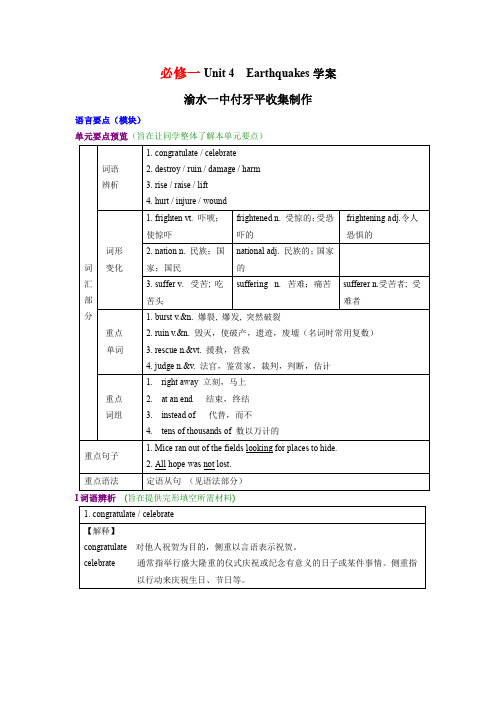
必修一Unit 4 Earthquakes学案渝水一中付牙平收集制作语言要点(模块)单元要点预览(旨在让同学整体了解本单元要点)I词语辨析(旨在提供完形填空所需材料)II词性变化(旨在提供语法填空所需材料)Ⅲ重点词汇(旨在提供综合运用所需材料)1. burst v.&n. 爆裂, 爆发, 突然破裂[典例]1).The red balloon suddenly burst. 那个红色的气球突然爆了。
2). The police burst through the door. 警察破门而入。
3). On hearing the news, Leslie burst into laughter while Tracy burst out crying.一听到这则消息,Leslie突然大笑,而Tracy则突然大哭起来。
4). A burst of hand-clapping followed the ending of the song.歌声结束后响起了一阵掌声。
[重点用法]burst into laughter = burst out laughing 突然大笑burst into tears = burst out crying 突然大哭[练习] 中译英1). 水管在寒冷的天气里经常冻裂。
__________________________________________________________________________________________2). 太阳突然从云端里露出来。
_______________________________________________________________________________ ___________答案: 1). Water-pipes often burst in cold weather.2). The sun burst through the clouds.2. rescue n.&vt. 援救,营救[典例]1). The police came to his rescue and pulled him out of the river.警察来救他,把他从河里拉了出来。
- 1、下载文档前请自行甄别文档内容的完整性,平台不提供额外的编辑、内容补充、找答案等附加服务。
- 2、"仅部分预览"的文档,不可在线预览部分如存在完整性等问题,可反馈申请退款(可完整预览的文档不适用该条件!)。
- 3、如文档侵犯您的权益,请联系客服反馈,我们会尽快为您处理(人工客服工作时间:9:00-18:30)。
Unit 4 Earthquakes主备人:田炜炜The First Period :Warming up and Pre-reading学习目标:1. 语言目标:掌握以下单词和词组。
right away well(n) burst as if at an end ruin in ruins injure destroy shock rescue trap dig out bury a (great) number of useless2.能力目标:用英语谈论地震相关的事情。
Step 1:温故互查Try to finish the following according to your experiences;1. Have you ever experienced any natural disasters? Give the names of the natural disasters you know. (____________________________________________________ )2. Imagine there is a big earthquake. What might happen to all the things? (Houses will _______; roads will get _________; bridges will be ________; people will be ________or________)4. Imagine there is an earthquake now. Your home begins to shake and you mustleave it right away. You have time to take only one thing. What will you take?Why? (discussion)5. Look at the pictures of new Tangshan, do you know what happened to it in 1976?(_______________________________________________)Step 2:设问导读Look at the pictures on Page 25. What do you think will happen before an earthquake. A.The water in the wells ____ and ____. And some deep ______ could be seen in thewell walls. A ______ gas came out the cracks.B. Mice ran out of the fields __________ places to hide. Fish _________out of bows andponds.C. The chickens and even pigs were ______ nervous _____eat. The dog was ________ loudly again and again.D. People could see _______lights in the sky.Step 3:自学检测I. 学以致用.(表达谢意,感激之情):1. I would like to express my thanks to …..who…2. Here, I wish to express my thanks for the great efforts…..3. I’d also like to thank……4. No words are strong enough to express our….II. Finish the following words and phrases:1. 骑自行车的人_____________2. 祝贺v.___________ n.___________3. 地震_______________4. 立刻,马上______________5. 井_________6. 爆发_____________7. 百万_____________千_________ 百____________8. 事件,大事__________9. 结束,终结___________10. 民族,国家_______________11. 严重受损,破败不堪_____________12. 苦难,痛苦n._______________13. 极度的adj.______________极度地adv. ___________14. 损害,伤害______________15. 破坏,毁坏_____________16. 无用的,无益的____________17. 震惊_______________ 18. 援救,营救____________19. 使陷入困境,陷阱_____________20. 电,电流,电学____________21. 掘出,发现__________________22. 埋葬,掩埋__________________23. 矿井____________矿工_______________24. 许多,大量的___________25. 记者__________________26. 损失,损害_______________ 27. 使惊吓,吓唬______________受惊吓的,受恐吓的_________令人恐惧的______________28. 法官,判断_____________29. 表达,快车____________30. 避身处___________31. 真诚地,真挚地______________32. 死难者_______________ 33. 准备,预备______________ Ⅲ短文改错(每一行都有一个错误,共10小题;每小题1分,满分10分)I am anxiously expecting your letter, and at last76._______it reached to me. I'm very glad to know that77._______ everyone at home is enjoying good health as usually.78._______ Things here are same now as they were before.79._______ The final examination will take place in next week.80._______ So I am now busy prepare my lessons. It's nice81._______ to think that the summer vacation coming near.82._______I can't say now how many I want to see you all again.83._______I'm looking forward to spend summer days with you.84._______ Give my loves to father, mother and others at home.85._______Ⅳ. Remember the following words:1.earthquake2.snowslide3.tornado7.fire 8.mudflow 9.flood 10.typhoon4.volcano5.sandstorm6.hurricaneThe Second Period :Reading学习目标:培养学生的阅读技巧。
学习难点:充分理解段意。
教学步骤:Step 1:设问导读Skimming: 快速浏览全文,找出每段的段落大意;仔细观察每段的第一句话。
Part1 (Para___________)Topic sentence: Strange things were happening in northeast HebeiMain idea: warning signs before the earthquakePart2 (Para2—3)Para2: _________________________________________________________________ Para3:__________________________________________________________________ Main idea: _____________________________________________________________ Part3 (Para4)Topic sentence: All hope was not lostMain idea: _____________________________________________________________ Step 2:自学检测:. Retell the story: Read aloud the story___________happened in Tangshan. For a few days, water in the wells ____ ______ From the________ of wells _______came out. Mice, chickens, pigs and ev en fish became _______At 3:00 a.m., everything began to ________It seemed that the world was__________ .__________of the nation _________ it._____________ c ut across the city. The city lay __________Two thirds of the people _____________ or ________.Then later that afternoo n, another big earthquake_____________ Tangshan. People began to wonder _____ ______________ But all hope ________________ Soldiers came to help those____ _________ Slowly, the city began to______________ again.Step 3 拓展延伸: Finish off the exercises on Page 27The Third Period:Learning about language学习目标:掌握重要词汇和表达方式重点知识:1. For three days the water in the village wells rose and fell, rose and fell.*rise 上升,升起,上涨rise against反抗They all rose against the king.rise和raise的区别:rise vi.指继续上升,常用于日,月,云,雾,烟,物价,温度,河水,潮水及人的职位等。
